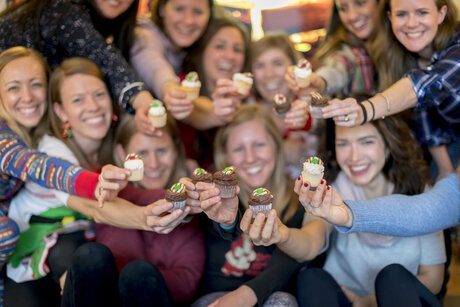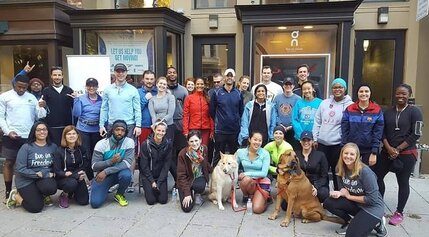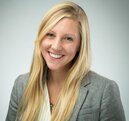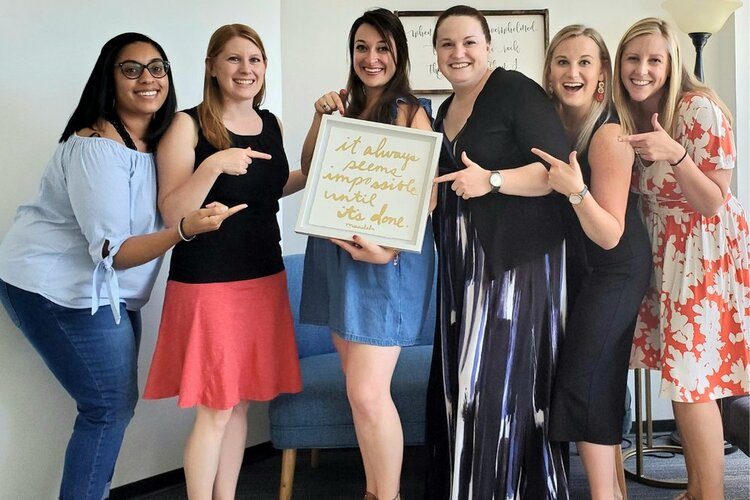The work of Rock Recovery in addressing eating disorders and related mental health issues is unique and inspiring. Rock Recovery staff and therapist team are shown in the above photo. Giant Food has supported this nonprofit through its Community Bag Program.
Tell us about Rock Recovery.
We were founded in 2009 by a lovely woman named Dr. Carolyn Larson and a number of women that she had known throughout her life. The whole purpose of Rock Recovery is to bridge gaps in treatment and understanding of eating disorders and related mental health issues. Our mission statement is to support the journey to freedom from disordered eating.
Our work is really unique. There are other nonprofits that work in the eating disorder body image field, but we do education support groups and direct therapy treatment because mental health coverage is really challenging. A lot of therapists and technicians don’t take insurance, so people are paying $150-200 an hour for treatment. But that’s just not possible for a lot of people. We offer all sliding scale services, accessible to anyone who needs it. We do in-person support here at our office in Arlington, Virginia, and then virtual services for people in Maryland, Virginia and DC. We also provide virtual support groups nationwide.

What services do you provide to the community?
We provide three main programs. The first is our community empowerment, comprised of workshops with corporations, churches, schools, universities and the general public, just to help raise awareness about eating disorders, body image issues and any kind of mental health condition.
Second, we do support groups that are all online and virtual, many of which have a faith-based component for people who want to integrate spirituality. It’s hard to find people who do faith and science well, so we do programs that integrate both for people. We have different six-week workshops and then some ongoing weekly support groups focused on different topics like intuitive eating, body image and finding your true identity.
We talk a lot about how we give people the gift of “I get it.” What a relief to hear that, to know you are not alone!
Then, third, the main portion of our work is direct therapy treatment offering. So, we do a lot of groups. All of our services are meant to help people who don’t quite need to go to a higher level of care, like a residential or a hospital setting, but they want more than just individual therapy. They want community; they want people who get it.
We talk a lot about how we give people the gift of “I get it.” You’re sitting in a room, saying something that feels so vulnerable and scary about how you’re struggling. Someone else says, “Oh yeah, me too…I get it.” What a relief to hear that, to know you are not alone! Because the biggest lie we can believe is that “it’s just me” or “something is wrong with me.” And there’s not. There are millions of people who are struggling with eating issues. We do group meal support where people actually come together and eat dinner together and then do therapy. We have body image-based therapy groups talking about self-esteem, resilience and building a positive self-image. And then we do individual therapy sessions as well. And all of that is sliding scale so cost is never an issue.
These programs are for people of all genders, but more women struggle with these issues than any other population.
What sets you apart from other organizations in your community?
What sets us apart is that we offer individual and group treatment, do a sliding scale, and integrate faith for people who want it; that is an important part.
Part of why our founder started Rock Recovery was because she felt like it was a calling for her. We want to serve all people. Our doors are open very wide, and we don’t discriminate. We’ve had a lot of people come who, if they are really strong Christians, only want something that comes from that perspective and they won’t do anything else. Unfortunately, a lot of faith communities don’t know how to address mental health really well. Fortunately, we’re able to integrate faith with addressing mental health.
Tell us a story that illustrates the good work of your organization.
We have lots of stories, but this is one of my favorites, though it happened some time ago.
A woman named Christine came to our program years ago. We were the first thing she ever did for treatment. She had an idea that she was struggling but didn’t really know what to call it or how to put a name to it, which was bulimia. But she came to our meal support treatment group.
She went to the program for, I think, about nine months. We often allow people to bring a family member or someone from their own personal support group to group meetings once a month, just to reinforce their support network at home, know how to care for them and what to say and not to say. So, she invited her parents; they became really supportive, and they became a really big part of her support system.
Eventually, she graduated from our program and decided to quit her high-powered job and go back to school to become a nurse. Now she’s a labor and delivery nurse, and she just loves it and feels so fulfilled. She said she never would have made such a life-changing decision if she hadn’t gotten healthy and well through our program.
What is your most outstanding achievement or contribution to the community?
We’ve really grown during the last couple of years. COVID was really hard for everyone, for lots of reasons. Inquiries for our programs went up 400%, literally overnight. We were on the phone 15-16 hours a day. We actually were able to suddenly move things online and reach people across the whole state of Virginia and the entire U.S.
That was a big accomplishment for us, to go from having our brick-and-mortar office here. Providing our services in person is wonderful, but expanding to reach people who don’t have access to resources if they’re in a rural place or don’t have affordable resources wherever they are was just a huge accomplishment for us.
We’re still running about 60% of our programs virtually, even though we’re also back to in-person. The majority of what we do is virtual now, and it’s just been amazing. It was a blessing in disguise.
A lot of people struggle with eating disorders but manage it well enough to get through each day. But COVID made them decline and get a lot worse. Otherwise, I think a lot of people would never have reached out for help if they hadn’t worsened. They declined, but then they got better. So, it did bring some redemption.

What do you want people to know about Rock Recovery?
I want people to know that it really is possible to live at peace with food and your body. It’s hard in this culture, but we are really helping people find healing and freedom that is hard to find anywhere else.
I want people to know that it really is possible to live at peace with food and your body.
It really is possible to get better. I’m living proof. Our founder had her own story, and we have hundreds and hundreds of clients we’ve served who have similar stories.
I think people who don’t have these battles with food cannot comprehend these issues. They can understand having a drug problem, an alcohol problem or a gambling problem. But when it comes to food, they look at it much differently.
A lot of our staff have lived experience, so there is so much they can bring to the discussion and treatment. It requires specialization in training, and therapists who aren’t trained in eating disorders specifically can cause more harm than good because this is a pretty counterintuitive thing to treat.
How will you use the funds raised from the Giant Food Community Bag Program?
We’ll use these funds to provide scholarships for access to our programs and help more people get access to the care that they need.

Christie Dondero Bettwy is Executive Director of Rock Recovery. Christie became Rock Recovery’s first staff member in April 2013 after serving as a faithful volunteer for three years.
Published February 15, 2023.

